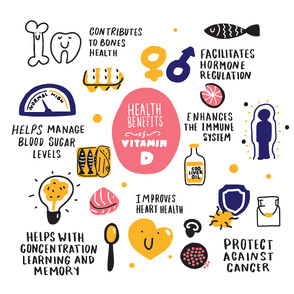4 Key Points To Take Home
How is it produced?
How do you maintain optimum levels?
What factors affect Vitamin D levels?
Vitamin D deficiencies and risk of infections and illness.
Immune Health & Vitamin D3
Vitamin D, also known as the ‘sunshine vitamin’, has many important roles in our body and in keeping us healthy and well. It’s most well known role is in aiding calcium absorption and bone density, but other important roles have been found in recent years.
Vitamin D works by turning on and off genes and processes necessary to maintain health. This is achieved by active vitamin D binding to vitamin D receptors in many areas of your body – bones, intestines, colon, brain, and immune cells – promoting vitamin D responsive genes (turning them on).
In mental health Vitamin D can be very supportive for:
Anxiety
Depression
Stress
Insomnia
CHECK OUT OUR ADDITIONAL BLOG ON VITAMIN D AND MENTAL HEALTH HERE |
How Is It Produced?
Vitamin D is produced within the body as a result of adequate exposure to sunlight. In New Zealand, due to the dangers of over exposure to the sun creating a possible ‘over protection’ and the lack of exposure during the winter months, can result in vitamin D deficiencies. This is also coupled with the fact that food containing high vitamin D, such as cod liver oil, seafoods, egg yolks, organ meats and fortified milk products, are uncommon in our diets.
In this Part 1 series – we will focus on the benefits of vitamin D for immune health. In Part 2, we will explore how mental health can be supported by it.
When it comes to our immune system, vitamin D is an important immune regulator, as part of our innate immune system. This is part of our natural body protection against foreign particles like viruses, parasites, bacteria etc or limiting their ability to spread and move through our body.
OUR INNATE IMMUNE SYSTEM | ||
|---|---|---|
Physical barriers | Gastrointestinal tract | |
Defence mechanisms | Mucous secretions | |
General immune | Inflammation |
How To Maintain Optimum Levels
As mentioned before, it is challenging to maintain optimum levels of vitamin D with our modern diet and lifestyle. Most of us spend most of our days indoors, and when we are outdoors we are often covered or do not spend enough time exposed to the sun. In New Zealand, we should at least aim for 20 minutes of skin exposure (face and arm or face and legs) to the sun daily (avoiding the time of the day the sun is too intense, 10 am to 4 pm).
It is very important to be sensible when exposing your skin to the sun, and balancing the risks of skin cancer, and never get sunburnt. People that are at risk of skin cancer or are taking medications (some are photosensitising), should avoid sun.
What Factors Affect Vitamin D Levels?
Skin color (lighter skin needs less exposure than darker skin)
Age
Weight
Mobility
How much vitamin D you get from your diet
If you are taking certain medications
Skin cancer risk
Where you live in New Zealand
Season/time of year and/or time of day
Certain medical conditions
You cannot make Vitamin D from a sunny window as it filters the UVB waves
It is also good to point out, you must be outdoors to produce vitamin D from sun exposure – you cannot make vitamin D from a sunny window, as it filters the UVB waves.
Fat malabsorption is another challenge in maintaining optimal levels of vitamin D, as it is a fat-soluble vitamin. This means your gut must be able to absorb dietary fat so it can absorb vitamin D.
You are what you absorb, and not exactly what you eat.
You may need to take specific digestive enzymes in order to digest and absorb fat and vitamin D if you’ve had you gallbladder removed.
Leaky gut or intestinal hyperpermeability can be another challenge in vitamin D absorption.
Covid-19 & Vitamin D Deficiencies
There are some great medical journal articles emerging internationally, indicating higher ICU risk with those deficient in Vitamin D3 (25-OH). If interested in reading more please click through to the links available.
"20-fold greater risk in the Vitamin D Deficient. These include BAME (Black, Asian and Minority Ethnic), African Americans, the Older, Institutionalised and Obese (diabetes, cardio-vascular disease and sedentary lifestyle). The obese consistently have proportionately lower vitamin D status". (https://www.bmj.com/content/36....)
"The link between diminished immune function and individuals with obesity raises important questions about the possibility for greater viral pathogenicity in this population." (https://onlinelibrary.wiley.co....)
"Vitamin D is a secosteroid hormone produced by the skin during Summer exposure to UVB rays. Hypovitaminosis D is common in Winter. In the past, coronaviruses and influenza viruses have exhibited very high seasonality, with outbreaks occurring preferentially during the Winter. The Covid-19 pandemic is indeed more severe above Winter latitudes of 20 degrees, while it remains until now less severe in the Southern hemisphere, with a much lower number of deaths. (https://clinicaltrials.gov/ct2...2...)
"Through several mechanisms, vitamin D can reduce risk of infections. Evidence supporting the role of vitamin D in reducing risk of COVID-19 includes that the outbreak occurred in winter, a time when 25-hydroxyvitamin D (25(OH)D) concentrations are lowest; that the number of cases in the Southern Hemisphere near the end of summer are low; that vitamin D deficiency has been found to contribute to acute respiratory distress syndrome; and that case-fatality rates increase with age and with chronic disease comorbidity, both of which are associated with lower 25(OH)D concentration." (hhttps://www.mdpi.com/2072-6643...3...)
"In 2017, The BMJ released a systematic review and meta-analysis using data from 25 randomized controlled trials. In these studies, the incidence of acute respiratory infection was evaluated in participant-level data from more than 11,000 participants given either vitamin D or placebo. The international team of authors concluded that vitamin D supplementation is safe and that it protects against acute respiratory tract infection. The benefit is greatest in subjects receiving weekly or daily vitamin D, and greatest in those who are deficient." (https://www.medpagetoday.com/i...)
AUTHOR |
|---|
Raissa Ringer (Naturopath & Medical Herbalist)
Contact The Good Health Room
If you would like to get your vitamin D levels tested and discuss the role of vitamin D on your immunity and mental health, then please email to enquire.
There are a range of vitamin D supplements available, but it is important to know what other key vitamins and minerals are required to help with the best absorption. Not all products are created equal. Let us help you support your vitamin levels this autumn and winter coming.
| References | ||
|---|---|---|
| https://www.health.govt.nz/sys... | ||
| https://www.health.govt.nz/you... | ||
| doi:10.1111/j.1753-4887.2008.00100.x |




